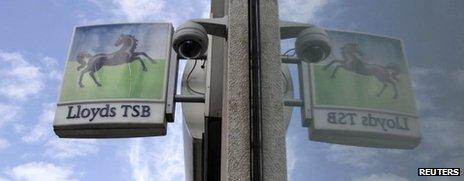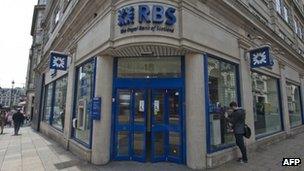Commission backs Lloyds as first privatisation
- Published
- comments

If George Osborne and Treasury agree with the Banking Commission's economic analysis, there is a clear implication for the two big semi-nationalised banks. A big chunk of Lloyds will be privatised before the next election, and no privatisation of the Royal Bank of Scotland will have taken place by then.
And, for what it's worth, a senior minister tells me he thinks that's the signal which will be sent out on Wednesday night by the Chancellor of the Exchequer in his annual address to the City at the Mansion House.
"Privatisation of RBS is for the next parliament," said the minister.
So why would Lloyds be in the fast lane away from public ownership while RBS is stuck in the Treasury's service station?
Well, it is because there is a very lively debate, which the Banking Commission has stoked up, about whether RBS needs to be reconstructed.
As I mentioned earlier this month (Will the bad be taken out of RBS? and Commission waters down RBS break-up call), the commission is in favour of hiving off the bad bits of RBS.

Its future is yet to be decided
The final report says that "there may be significant advantages" to "splitting RBS into a good bank and bad bank".
But the commission accepts that it didn't conduct forensic investigation of the costs and risks to taxpayers, whether it would help or hinder privatisation or whether there would be tricky state aid implications.
So it wants Treasury to properly investigate the pros and cons, and publish a detailed report on this for Parliament to scrutinise by September.
This Treasury report would also look at two other possible routes for reshaping RBS:
the full separation of its investment bank, which some would see as the logical conclusion of the chancellor's pressure on RBS to shrink its investment bank and concentrate on UK retail banking
the Archbishop of Canterbury's grand plan (the archbishop is an influential commission member) for the supposedly good bits of RBS to be privatised not as a single entity but broken up into small perhaps regional banks, to "support the emergence of a more diverse and competitive retail banking market".
Now, within the cabinet, there will be a lively debate about all this.
Vince Cable, the Business Secretary, believes that the current plan to shrink RBS's massive market share in small business banking - so-called Project Rainbow, which involves the sale of 315 branches - isn't ambitious enough.
He would like RBS obliged to sell off a rather bigger retail banking business to spur competition.
But his main priority for RBS is that it should be set new targets for providing credit to small businesses, and that the pay and rations of whoever fills the vacant position of RBS chief executive should be explicitly and strongly linked to hitting those targets.
What, however, is very striking about the commission's proposals is that there is very clear tension in them when it comes to RBS.
On the one hand, the commission urges radical measures that would postpone privatisation.
On the other, it says that RBS is "weighed down... by having the government as its main shareholder".
It complains of "political interference" in the banks, which it says has been worse at RBS than at Lloyds - and therefore says that privatising would be a good thing in and of itself.
That said, the commission wants any political interference to be more explicit and transparent - and therefore recommends the closure of UK Financial Investments, the agency charged with managing the Treasury's big shareholdings in Lloyds and RBS.
In a resonant passage, the commission says that "UKFI will increasingly be seen as a fig leaf to disguise the reality of direct government control".
This is particularly apt just days after the chancellor has been accused of bundling Stephen Hester out of the window and out of his seat as RBS chief executive.
In other words, the commission wants greater and more open political engagement with RBS in the short term, to facilitate its liberation and return to the private sector in the longer term.
As for Lloyds, the commission says "it appears better placed to return to the private sector without additional restructuring".
As it happens, the chancellor would agree - and will reveal more about how the privatisation of Lloyds will begin, perhaps even later this year, at the Mansion House on Wednesday night.